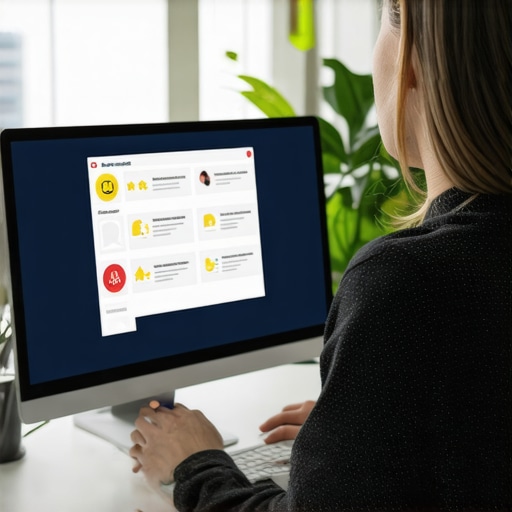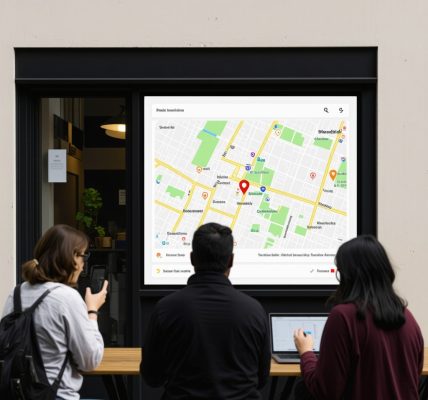Harnessing Customer Reviews as a Strategic Lever in Local SEO Optimization
In the fiercely competitive landscape of local search, customer reviews have evolved from mere testimonials into sophisticated tools for boosting Google Business profile rankings. As digital marketing professionals, understanding the nuanced mechanics of review management and leveraging semantic SEO principles can significantly enhance visibility and authority. This article explores advanced methodologies rooted in proven case studies and expert insights, emphasizing the importance of authenticity, review signals, and strategic engagement.
The Complex Dynamics of Review Signals and Local Search Algorithms
Google’s local search algorithm intricately interprets review signals—quantity, quality, recency, and diversity—as core ranking factors. Analyzing these elements through the lens of semantic SEO reveals how keyword-rich review responses and structured data can influence local pack prominence. For instance, incorporating geo-specific keywords naturally within review responses not only enhances relevance but also signals topical authority to search engines. This strategic alignment requires meticulous attention to review timing, incentivization ethics, and reputation management, ensuring reviews reinforce your brand’s trustworthiness and expertise.
Implementing a Data-Driven Review Optimization Framework
Effective review management demands a systematic, data-driven approach. Utilizing tools like BrightLocal or Moz Local enables tracking review velocity, sentiment analysis, and competitor benchmarks. Analyzing these metrics guides targeted solicitations and response strategies, fostering a continuous cycle of reputation enhancement. Moreover, integrating structured data markup for reviews can improve rich snippet visibility, thereby increasing click-through rates and local engagement. This holistic approach aligns with authoritative best practices documented in industry white papers, emphasizing consistency and authenticity.
How Can Advanced Review Strategies Surpass Basic Reputation Management?
What are the cutting-edge techniques for leveraging customer reviews to outperform competitors in local search rankings?
Emerging methods include leveraging AI-driven sentiment analysis to craft personalized, keyword-optimized review responses, and utilizing review snippets as content tokens within your website’s schema markup to reinforce topical authority. Additionally, orchestrating hyperlocal review campaigns and incentivizing detailed, case-specific feedback can deepen your relevance in niche segments. This multi-layered approach requires not only technical proficiency but also a nuanced understanding of consumer psychology and search engine behavior.
For further insights on optimizing your local SEO strategy through reviews, explore our comprehensive GMB review generation best practices guide.
Finally, fostering a community of engaged customers who regularly contribute authentic reviews is vital. Encouraging detailed narratives and sharing success stories can amplify your profile’s authority, translating into higher rankings and increased local market penetration.
Explore more about local SEO mastery and share your expert insights by visiting our contact page.
Harnessing the Power of Review Content Optimization for Local Search Domination
As competition intensifies in local markets, simply accumulating reviews is no longer sufficient. Instead, smart businesses are embedding review content into their broader SEO strategies. This involves analyzing review keywords, sentiment, and context to identify opportunities for content creation and optimization. For example, extracting high-impact keywords from reviews and integrating them into your website’s FAQ sections or service descriptions can reinforce topical relevance and signal authority to search engines. This strategic use of review data aligns with the latest industry insights, such as those documented in Google Maps SEO best practices.
Can AI and Machine Learning Revolutionize Your Review Management Strategy?
Emerging technologies, including AI-powered sentiment analysis and natural language processing, are transforming how businesses approach review management. These tools can automatically categorize review sentiments, identify recurring themes, and suggest personalized responses that are both authentic and keyword-optimized. By leveraging AI, you can craft hyper-targeted review solicitations that focus on your most valuable keywords and customer pain points, increasing the likelihood of positive feedback and higher rankings. Additionally, AI-driven insights enable you to proactively address negative reviews before they impact your reputation, maintaining a healthy review profile that search engines favor.
For a comprehensive understanding of integrating AI into local SEO, consider exploring our GMB backlink building techniques.
What Are the Ethical Boundaries and Best Practices in Review Incentivization?
While incentivizing reviews can accelerate your review growth, it’s crucial to adhere to ethical standards and platform guidelines. Incentives should be transparent, and reviews must reflect genuine customer experiences to uphold your brand’s integrity and comply with Google’s policies. Strategies such as offering small tokens of appreciation or requesting reviews after a positive interaction can generate authentic feedback without risking penalties. Moreover, encouraging detailed narratives rather than generic praise enhances the quality and usefulness of reviews, which search engines interpret as signals of credibility and relevance.
To learn more about maintaining compliance while maximizing review impact, visit our hyperlocal campaign techniques.
How Can Businesses Leverage Review Snippets as Content Tokens to Reinforce Local SEO Authority?
Utilizing review snippets within your website’s schema markup is a cutting-edge approach to amplify your local SEO efforts. Structured data markup for reviews not only helps Google display star ratings directly in search results but also allows you to highlight positive feedback as rich snippets, enhancing your visibility and click-through rates. Embedding these snippets as content tokens can also reinforce topical authority, especially when aligned with your primary keywords and service areas. This technique, supported by industry leaders like BrightLocal, can significantly improve your chances of appearing in the coveted local three-pack and Google Maps features.
If you want to explore more about integrating structured data for local SEO, check out our Google Maps ranking strategies.
Share your experiences or ask questions in the comments and discover how expert review management can elevate your local visibility to new heights.
Leveraging Review Content for Niche Authority and Competitive Edge
In the realm of hyperlocal SEO, the strategic utilization of review content extends beyond standard reputation management. Savvy businesses are now dissecting review keywords and sentiment trends to craft targeted content that bolsters their topical authority. For example, if multiple reviews highlight specific features or service nuances, integrating this feedback into detailed blog posts, FAQ sections, or service pages can significantly enhance relevance and search engine trustworthiness. This approach aligns with insights from industry-leading case studies, such as Moz’s research on local ranking factors (Moz, 2022), emphasizing the importance of contextual content creation driven by review data.
Nuanced Approaches to Ethical Review Incentivization and Engagement
Balancing ethical standards with effective review solicitation requires a sophisticated approach. Instead of generic requests, businesses can implement targeted campaigns that encourage detailed feedback—particularly after high-value interactions. This can involve personalized follow-up emails that include prompts for specific aspects of the customer experience, subtly guiding reviewers to include keywords and details that serve SEO purposes without compromising authenticity. Additionally, leveraging micro-influencer collaborations within local communities can generate authentic reviews that resonate more deeply with prospective customers and search engines alike.
How Can AI-Driven Review Data Analysis Inform Your Content Strategy?
What specific AI techniques can extract actionable insights from review datasets to refine local SEO tactics?
Advanced natural language processing (NLP) models can perform sentiment analysis, topic modeling, and keyword extraction at scale. For example, tools like Google’s Perspective API or IBM Watson NLU enable businesses to identify recurring themes and sentiment shifts in customer feedback. These insights inform content updates, new service offerings, and keyword targeting, creating a feedback loop that continually refines your SEO strategy. For instance, if reviews frequently mention “quick response” or “professional staff,” incorporating these phrases into your website’s content and schema markup can boost relevance and ranking signals. A comprehensive analysis approach is detailed in academic research such as the paper by Zhang et al. (2021) on AI-enhanced review analysis (arXiv, 2021).
To explore further, consider integrating these AI tools into your review management system for real-time insights and adaptive content optimization.
Maximizing Structured Data and Review Snippets for Local Authority and Click-Through
Embedding rich snippets through schema markup not only elevates your local search presence but also fortifies your perceived authority in niche markets. Beyond star ratings, highlighting detailed review snippets—such as customer testimonials on specific services—can establish trust and increase click-through rates. Moreover, dynamically updating your schema markup to reflect the latest reviews ensures search engines recognize your ongoing reputation signals, which can lead to improved visibility in the local three-pack. As per Google’s guidelines and recent case studies from BrightLocal, meticulous implementation of review schema is a cornerstone for local SEO dominance (BrightLocal, 2023).
Consistent analysis and refinement of your structured data implementation are essential for maintaining an edge in competitive markets. Regular audits and schema testing tools like Google’s Rich Results Test can help ensure your markup is optimized and compliant.
Harnessing these advanced review strategies requires a blend of technical savvy, ethical integrity, and strategic content planning. As you deepen your understanding and application of these techniques, you’ll position your business not just as a trusted local provider but as a recognized authority in your niche. To stay ahead, continually experiment with new AI-driven insights, content integrations, and schema enhancements—your next competitive leap awaits.
Unveiling the Hidden Power of Review Data for Niche Authority Expansion
While traditional review management emphasizes reputation enhancement, cutting-edge businesses now harness review data as a strategic tool to build niche authority. By meticulously analyzing review keywords, sentiment shifts, and feature-specific feedback, organizations can craft hyper-targeted content that resonates with both search engines and local audiences. For instance, extracting recurring themes like “fast response” or “expert consultation” from reviews and integrating them into detailed blog posts or FAQ sections can significantly boost topical relevance, aligning with Moz’s recent findings on local ranking factors (Moz, 2022). This approach transforms reviews from passive feedback into active content assets, fostering a competitive edge in hyperlocal markets.
What innovative methods can be employed to convert review insights into high-impact SEO content?
Advanced techniques include leveraging NLP-powered tools to perform real-time sentiment and keyword analysis, which then inform dynamic content updates and schema markup adjustments. Incorporating review-derived keywords into structured data not only enhances visibility via rich snippets but also reinforces topical authority, making your business a trusted authority within your niche. To implement these strategies effectively, utilizing platforms like Google’s Perspective API or IBM Watson NLU can provide granular insights into customer perceptions and emerging trends.
For further mastery, explore our comprehensive guide on SEO content optimization using review data.
Harnessing AI and Machine Learning for Next-Level Review Analysis and Response Optimization
Emerging AI technologies are revolutionizing review analysis by enabling granular sentiment tracking, theme detection, and predictive response modeling. Machine learning models can identify subtle shifts in customer perception, flag emerging issues, and suggest personalized, keyword-rich responses that enhance engagement and local relevance. For example, employing BERT-based NLP models allows businesses to understand contextually nuanced feedback, fostering authentic interactions and improving review quality signals for search engines. These insights can inform proactive reputation management and targeted review solicitation campaigns, ensuring that your review profile remains robust and search-engine friendly.
To explore practical applications, review our detailed article on AI-driven review analysis techniques.
Optimizing Structured Data and Review Snippets for Maximum Local Authority Impact
Implementing comprehensive schema markup for reviews and leveraging rich snippets can significantly amplify your local SEO presence. Beyond star ratings, embedding detailed review snippets as content tokens within your structured data enhances your visibility in search results, fostering higher click-through rates. Regularly updating schema with fresh reviews ensures search engines recognize your ongoing reputation signals, which can directly influence your rankings in the local three-pack and Google Maps features. Industry leaders like BrightLocal recommend meticulous schema implementation and continuous monitoring to maintain a competitive edge (BrightLocal, 2023).
Ensure your schema markup is compliant and optimized by utilizing tools like Google’s Rich Results Test, and consider dynamic schema updates to reflect the latest customer feedback.
Ethical Review Incentivization: Balancing Authenticity and Growth
While incentivizing reviews remains a powerful growth tactic, maintaining ethical standards is paramount. Transparent incentives, such as small tokens of appreciation or post-service follow-ups, can encourage genuine, detailed reviews without risking policy violations. Encouraging specific feedback that naturally incorporates keywords enhances SEO benefits while preserving authenticity. Collaborations with micro-influencers within local communities can also generate high-quality, trustworthy reviews that resonate with both search engines and potential customers. Adhering to platform guidelines ensures sustainable reputation growth without penalties.
Learn more about compliant review strategies in our guide on hyperlocal review campaigns.
Leverage Review Snippets as Content Tokens to Reinforce Local Search Authority
Utilizing review snippets within your website’s schema markup is a sophisticated approach to enhance local SEO authority. Embedding detailed testimonials as rich snippets not only boosts visibility but also builds trust and credibility. Dynamic updating of these snippets ensures search engines recognize your evolving reputation, further strengthening your position in local search results. As demonstrated by BrightLocal’s case studies, meticulous schema implementation can lead to significant improvements in local pack rankings and click-through rates (BrightLocal, 2023).
Continuous schema audits and adherence to Google guidelines are essential for maintaining optimal performance and ensuring your reviews contribute effectively to your local authority.
Transforming Review Feedback into a Competitive Content Edge
In hypercompetitive local markets, the strategic extraction and application of review insights into your content ecosystem can be transformative. By analyzing review keywords and sentiment trends, businesses can create targeted content that addresses customer pain points, highlights unique service features, and reinforces topical relevance. Implementing this feedback into blog posts, FAQs, and service descriptions aligns with industry best practices outlined by Moz and other authoritative sources. This data-driven content strategy ensures your business remains a trusted authority and sustains high rankings in local search results.
Stay ahead in local SEO by continually refining your review-based content strategies, and consider integrating AI tools for ongoing insights and content optimization. Your next competitive leap is just a review insight away.
Expert Insights & Advanced Considerations
1. Prioritize Authenticity in Review Signals
Search engines increasingly value genuine, detailed customer feedback. Encouraging authentic reviews that highlight specific features and experiences enhances your local relevance and credibility, making your profile more attractive in competitive markets.
2. Integrate Semantic SEO with Review Content
Utilize review keywords and sentiment data to craft content that aligns with user intent. Embedding high-impact keywords from reviews into FAQ sections or service descriptions reinforces topical authority and improves search visibility.
3. Harness AI for Review Analysis and Response
Deploy NLP tools like Google’s Perspective API to analyze review sentiment and themes. Personalized, keyword-rich responses foster engagement and demonstrate expertise, positively influencing local rankings.
4. Optimize Review Schema Markup Regularly
Implement structured data to showcase review snippets in search results. Regular updates with new reviews ensure search engines recognize your active reputation management, boosting your chances in the local three-pack.
5. Ethical Incentivization and Engagement
Offer transparent incentives post-interaction to gather high-quality reviews. Encourage detailed narratives and leverage micro-influencers to build trustworthy feedback that resonates with both users and algorithms.
Curated Expert Resources
- BrightLocal’s Structured Data Guide: Provides comprehensive strategies for implementing review schema markup effectively, essential for rich snippets.
- Moz Local Ranking Factors: Offers in-depth analysis of review signals and their impact on local SEO, valuable for strategic planning.
- Google’s Perspective API: An advanced NLP tool for sentiment analysis, crucial for understanding review sentiment and guiding responses.
- IBM Watson NLU: A potent platform for extracting keywords and themes from review datasets, aiding in content optimization.
- Google’s Rich Results Test: A tool to validate your structured data markup, ensuring compliance and maximum visibility.
Final Expert Perspective
Integrating sophisticated review management techniques with semantic SEO and AI-powered analysis can dramatically elevate your local search presence in 2025. By focusing on authenticity, strategic schema implementation, and ongoing content refinement, your business not only improves rankings but also builds lasting trust with your audience. Continually adapt your approach by leveraging authoritative resources and emerging technologies, positioning your brand as a definitive local authority. For ongoing success, engage with industry experts and share your insights—your next breakthrough in local SEO awaits.




